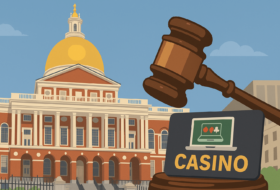
Last week, news broke that Apollo Global Management is selling its final 22% stake in American Gaming Systems (AGS), known these days as PlayAGS. For much of the past decade, Apollo was the largest shareholder of the Las Vegas-based AGS and, at one time, its sole owner.
For some time now, casinos have served as a preferred playground for private equity. Another company, Blackstone, has been attracting much of the media’s attention over the past decade, snapping up landmark properties like the Cosmopolitan, Bellagio, MGM Grand and Mandalay Bay.
However, Apollo was making some serious wagers in Sin City before Blackstone came to town. The first was a 2008 top-of-the-market $28 billion leveraged buyout to acquire Harrah’s Entertainment. The deal almost immediately went south. Apollo and its partner TPG attempted to extricate themselves from the situation at the expense of their creditors before losing a multi-year legal battle.
More recently, in February 2022, Apollo partnered with REIT VICI on a $6.25 billion acquisition of Las Vegas Sands’ domestic assets. VICI paid $4 billion for the land and buildings, while Apollo paid $2.25 billion for the operations of the Venetian and Palazzo resorts, plus the Venetian Expo.
Its involvement with PlayAGS was a smaller foray into a different side of the gaming industry. Overlooked compared to those larger deals, it’s now back in the news thanks to Apollo’s decision to divest itself of the company.
Dabbling in the B2B Side of Gambling
Apollo acquired AGS from San Francisco-based Alpine Investors in December 2013. That deal valued AGS at roughly $240 million and included $100 million of Apollo’s equity.
In the aftermath of the acquisition, former AGS CEO Robert Miodunski announced his retirement. He was replaced by David Lopez, the former CEO of Global Cash Access.
Since then, Apollo and Lopez have guided AGS through some 20 acquisitions. The largest was the $370 million purchase of another slot manufacturer, Cadillac Jack, in 2015.
Of most significance to this latest news, they also returned AGS to the public markets. Through a January 2018 IPO, Apollo issued just over 10 million PlayAGS shares at a price of $16.
In the eight months that followed, AGS shares soared. By the time trading began for non-IPO participants, they were already going for $17. From there, they nearly doubled to $32.80, creating a market cap of almost $1.3 billion by September 2018.
A Highly Volatile Stock
Since then, investors have been on a roller coaster. AGS shares plummeted 98%, hitting a low of $0.70 in March 2020. After this came a rebound to more than $11 in spring 2021.
Yet another downswing followed. At the time of the announcement of Apollo’s exit, AGS shares sat 44% off their 2021 highs.
As of November 22, PlayAGS shares are trading at around $5.30. The current market cap is roughly $200 million, a fraction of what it was in 2018.
In light of PlayAGS’s troubles, Apollo may regret rejecting a $10-per-share takeover bid from Inspired Entertainment in August.
The whole saga is bizarre. Even at the time, industry analysts received Apollo’s deal to acquire AGS with confusion. The company’s enterprise value was less than 1% of the Harrah’s buyout and less than 10% of what was a typical Apollo deal at the time.
Disgruntled investors appear happy to see Apollo end its involvement with the company. PlayAGS shares initially bounced on news of the sale. However, they lost another 16% on news of a secondary stock offering last week.





